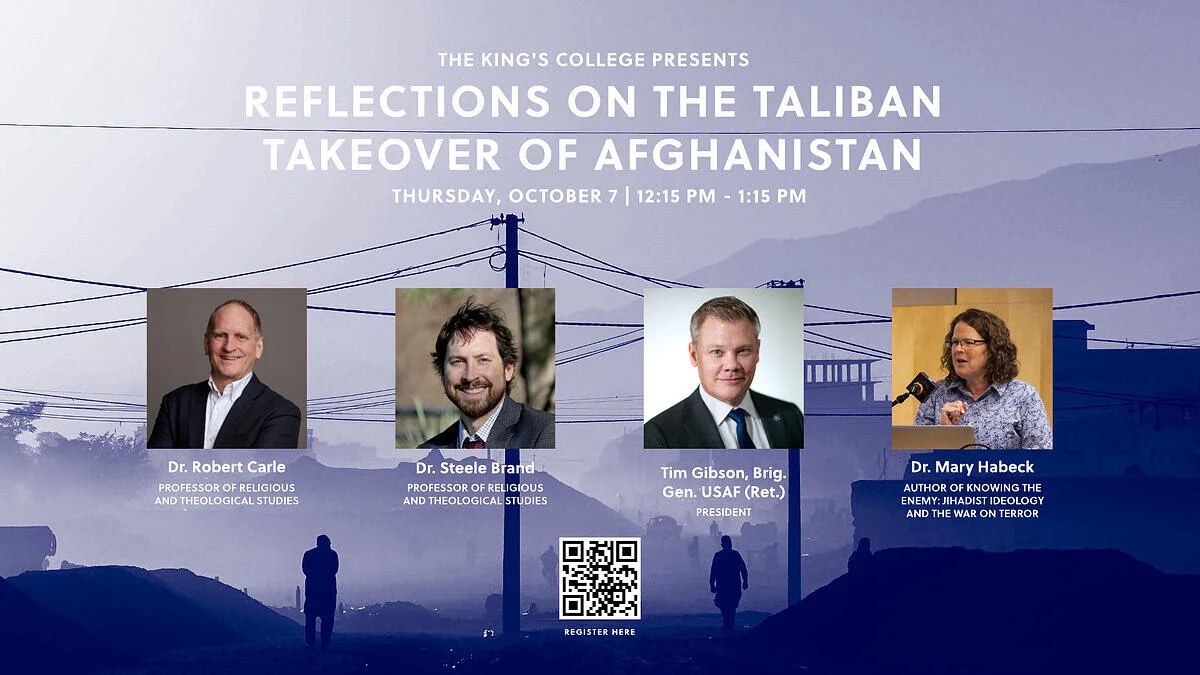King’s Hosts “Reflections on the Taliban Takeover” Webinar
| Photo courtesy of The King’s College
The King’s College hosted a Zoom Webinar regarding the Taliban takeover of Afghanistan on Thursday, Oct. 7. King’s faculty and scholars shared their perspective on America’s withdrawal from Afghanistan and its implications for the current world climate.
Dr. Joseph Griffith, the Assistant Professor of Politics, moderated the event. After opening remarks, he introduced the four main speakers: Dr. Robert Carle, Professor of Religious and Theological Studies; Dr. Mary Habeck, author of the book Knowing the Enemy: Jihadist Ideology and the War on Terror; Tim Gibson, retired Air Force Brigadier General and current TKC President; and Dr. Steele Brand, the Associate Professor of History. Dr. Griffith also hosted the Q&A session at the end of the event.
The first speaker was Dr. Robert Carle. He compared America’s involvement in Afghanistan to their involvement in the Korean Peninsula. He noted that in the War on Terror, we are now back in a similar place as in 2001. However, he also said that America is at less risk of becoming a foothold for Al-Qaeda than Europe.
“I think that Al-Qaeda will probably be more successful in Europe than in the United States because Europe has a large number of alienated, angry, regionalized and unemployed Muslims,” Carle said. “American Muslims, in contrast, are intended to be integrated, employed afterward and educated. They don’t make good terrorists.”
The next speaker was Dr. Mary Habeck. She addressed two questions. First, was this a war that America should have been involved in? And secondly, was this a war that could have been won?
To answer the first question, she first defined the enemy as both Al-Qaeda and the Taliban - the first one a terrorist group that attacked the United States on 9/11, and the other an extremist organization taking control of Afghanistan now.
“The entire war that was fought afterward was really about 9/11 and preventing another 9/11 from occurring,” Habeck said. “This is why this war had to be fought, why it was worth necessity.”
However, Habeck also argued that the War on Terror was not a war that the United States could have won. There were too many outside factors beyond our control, and the threat was too large and too widespread for us to take on alone.
Next was President Gibson. After relating his extensive military experience, with 32 years in the U.S. Air Force, he discussed America’s actual exit from Afghanistan and how it should have unfolded versus how it actually did.
“I give pretty low marks when it comes to the administration’s leadership as the withdrawal from Afghanistan is underway,” Gibson said. “There are very real costs that were incurred by the nation.”
Gibson shared the stories of two Air Force officers who were deployed to Afghanistan in 2013. They both came home to their families with American flags draped ceremoniously over their caskets.
“For these two families, this is not an academic topic,” Gibson said. “These are friends. So these stories matter a great deal to many of us.”
The final main speaker was Dr. Steele Brand. He titled his segment “Death, Defeat And Disgrace,” outlining each of these ideas during his reflection of the events discussed. He noted that even Romans like Cicero and Augustine experienced their fair share of failures in war. Brand argued that we did indeed fail in Afghanistan in these three ways.
“The defeat, the disgrace, have happened; this cannot be erased. Did the troops, or we could say the Afghans who were killed, die in vain?” Brand said.
Brand concluded that if we as Americans learned our painful lesson from our past mistakes in Afghanistan, there is yet a chance for us to keep those deaths from being in vain.
At the end of the event, each of the speakers answered submitted questions read by the moderator.
The questions tackled the topics of whether the global War on Terror was over, the effects and implications of America’s withdrawal on a global scale and what prevented us as a country from understanding the situation in Afghanistan better.
“I learned things,” Griffith said, ending the event, “and, we all have much to pray about in the coming weeks and months.”

